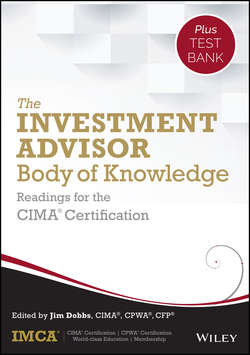Читать книгу The Investment Advisor Body of Knowledge + Test Bank - IMCA - Страница 16
На сайте Литреса книга снята с продажи.
CHAPTER 1
IMCA Code of Professional Responsibility and Standards of Practice
Part V IMCA Guidelines for Consultants Regarding the Acceptance of Benefits from Third Parties
ОглавлениеIn General
The consultant always should remain objective. The acceptance of benefits of any kind, such as cash, gifts, products, services, expense-paid trips, lodging, special events, and so forth, from investment managers or vendors other than the consultant's employer or client may have an impact on a consultant's objectivity. Even when a consultant's objectivity has not in fact been impaired, the possibility of conflicting interest that arises from the acceptance of third-party benefits weakens a client's confidence in the consultant's objectivity and is therefore detrimental to the consultant/client relationship. Acceptance of any material benefit by a consultant from a third party is therefore discouraged.
The guidelines that follow do not supersede any more stringent guidelines or rules established by employers or government agencies.
Definitions
1. THIRD-PARTY BENEFIT
A third-party benefit is any benefit received by a consultant or by any member of his family or household from any person or firm other than the consultant's employer or the consultant's client as a result of, or in the expectation or hope of generating professional relationships with the consultant, his employer, or his client. A third-party benefit may be cash or a noncash item or service that has value to the consultant. Gifts, merchandise, meals, tickets to events, trips, lodging, and outings are examples of noncash benefits.
2. MATERIAL
Any third-party benefit with a fair-market value in excess of $100 is considered material.
3. OCCASIONS
A third-party benefit is considered “occasional” if it occurs no more frequently than once a year.
Applicable Guidelines
1. A consultant should not solicit any third-party benefit under any circumstances.
2. A consultant should not accept any third-party benefit if its source is not identified.
3. A consultant should not under any circumstances accept any third-party benefit that is directly or indirectly linked to a manager or vendor's receipt of business from a client of the consultant.
4. No material third-party benefit should be accepted without the written approval of the consultant's employer.
5. A consultant should disclose to the client in writing any material third-party benefit he or she receives from a manager or vendor who also services that client. Disclosure is required if the consultant has, in fact or theory, any responsibility for the selection, monitoring, or evaluation of that manager or vendor for that client. Client disclosure in writing is not required if the client is present as a guest of the manager or vendor at the same event attended by the consultant, or if the client is present at the time the third-party benefit is delivered to the consultant.
6. A consultant should maintain a written record of all material third-party benefits received; this record should be open to inspection by the consultant's employer and client upon request.
7. Occasional meals, event tickets, or similar entertainment of a consultant and his or her guest need not be disclosed.
8. Reimbursement for the costs or expenses incurred when traveling to the offices of an investment manager for the purpose of conducting a due diligence inspection are considered to be a third-party benefit and should be treated accordingly.
9. A consultant may accept reimbursement for the reasonable cost or expense incurred in attendance at a training or educational meeting held by an investment manager or vendor, provided that his or her attendance at the meeting is approved in writing, in advance, by the consultant's employer and that it does in fact provide legitimate educational content. This reimbursement is, however, considered to be a third-party benefit and should be treated accordingly.
10. Attendance at industry-wide meetings or conferences, sponsored by multiple, totally unaffiliated investment managers or vendors or special events at such conferences, sponsored by a single manager or vendor, need not be disclosed, provided that the participation in sponsored events is open to all conference attendees.
